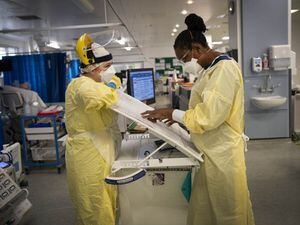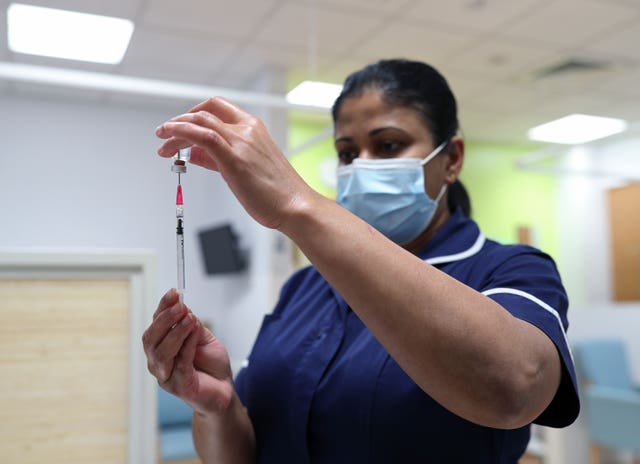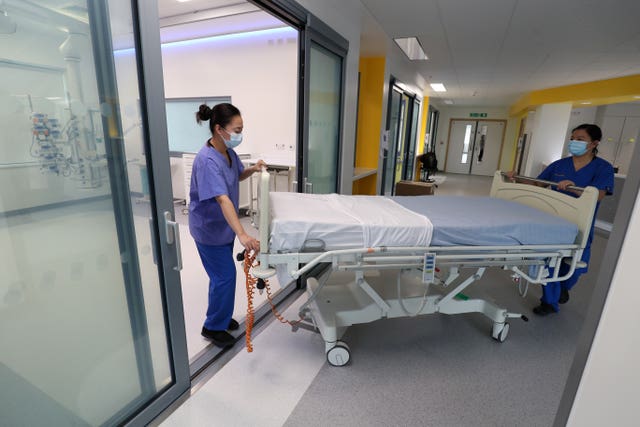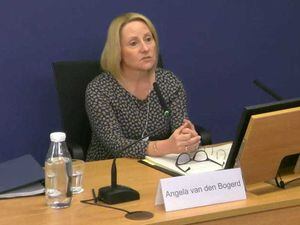Rise in experiences of discrimination for ethnic minority NHS staff in England
More than half a million NHS employees in England responded to the NHS Staff Survey 2020

More black and minority ethnic staff in the NHS in England have reported experiencing discrimination and are less likely to feel their organisation provides equal opportunities compared with white employees, a survey has found.
More than half a million NHS employees in England responded to the NHS Staff Survey 2020, which showed that black and minority ethnic staff were more likely to report working in coronavirus settings than white staff.
Findings showed half of all staff who worked in Covid-19 settings had felt unwell due to work-related stress, as well as a drop in the proportion of overall staff satisfied with their pay.
The past year has seen NHS staff face huge pressures dealing with the pandemic.
Almost a fifth are considering leaving the health service, according to the survey, although this has fallen slightly since 2019, from 19.6% to 18.2%.
This compared with 6.2% of white staff, up from 6% in 2019.
It also found that BAME staff were less likely to feel their organisation provides equal opportunities compared with white employees.
More than two-thirds (69%) of BAME staff said their organisation provides equal opportunities, down from 71% the previous year and 73% in 2016.
The figure for white staff in the latest survey, which was available to complete between September and December last year, was 87%.
The survey found that 47% of BAME staff said they had worked on a Covid-19 specific ward or area at any time compared with 31% of white staff.
Almost a quarter (23%) of BAME staff said they had been redeployed due to the pandemic at any time compared with 17% of white staff.

Dr Habib Naqvi, director of the NHS Race and Health Observatory, said: “The last 12 months have no doubt been the most challenging of times for NHS staff but these results should be a stark reminder to managers of their responsibility to lead by example and to foster fair and inclusive workplaces.”
Dr Rob Harwood, chairman of the British Medical Association consultants committee, said: “Stamping out discrimination and toxic cultures is vital if we’re to attract and retain the very best staff, so they in turn can provide the highest quality of care to patients.”
Overall, there was a fall in the proportion of staff who felt their organisation acted fairly with regard to career progression or promotion, regardless of ethnic background, gender, religion, sexual orientation, disability or age.
Some 83.6% felt this way in the 2020 survey, down slightly from 83.9% in 2019 and 85.5% in 2016.
Some 8.4% of staff reported personally experiencing discrimination at work in the last 12 months from managers or colleagues – up from 7.7% in 2019 and the highest level in the last five years.
More than four in 10 (44%) staff reported feeling unwell as a result of work-related stress in the previous 12 months, up from 40% the previous year.
Increases were steepest in acute and community trusts – big hospitals and community services – and acute specialist trusts, which provide specialist care such as paediatrics, cancer and orthopaedics.
Almost half (46%) of staff said they had gone to work in the previous three months despite not feeling well enough to perform their duties, a drop from 57% in 2019.

Half of the staff who said they had worked on a Covid-19 specific ward or area at any time reported feeling unwell as a result of work-related stress.
This compared with 41% of staff who had not worked in Covid settings.
Figures showed more than a quarter of staff experienced at least one incident of bullying, harassment or abuse from patients, their relatives or other members of the public in the previous 12 months.
The figure of 26.7% wad down from 28.6% in 2019.
Staff at ambulance trusts continued to experience more of this kind of treatment than at other types of trust.
Some 12.4% of NHS staff had experienced bullying, harassment or abuse in the previous 12 months from managers – up from 12.3% in 2019 – and 18.7% of staff faced this type of behaviour from other colleagues, down from 19% in 2019.
Prerana Issar, chief people officer for the NHS, said it is “right to ask that NHS staff are treated respectfully as they go about their work serving patients in often demanding circumstances”.
She added that the focus on healthcare workers’ health and wellbeing must be maintained “given the high level of work-related stress for staff caused by the pandemic” and paid tribute to the “extraordinary” way in which the health service had responded to the pandemic.
Mr Mortimer said the general findings were encouraging, “given the unprecedented and most challenging of times” over the past year, but there were “significant areas of concern”.
He said with nearly one in five people thinking of leaving the health service, there can be “no room for complacency” as he cited the Government’s “intention to offer only a 1% pay rise” to NHS workers – a move which has prompted strong criticism.
The proportion of NHS staff in England satisfied with their pay dropped slightly in 2020, the survey found.
It showed that 36.7% were “satisfied” or “very satisfied” with their pay, compared with 38% the previous year.
Of the professions surveyed, registered nurses and midwives saw the sharpest fall in satisfaction with salaries, dropping from 36% in 2019 to 33%.
Dame Donna Kinnair, general secretary of the Royal College of Nursing, said the staff survey results should “act as a stark reminder to ministers of why a 1% pay rise is so disrespectful after the last year” and that “much more needs to be done” in terms of “keeping and looking after those already in the profession”.
The survey, which has been conducted every year since 2003, was sent out to more than 1.2 million NHS staff in England and completed by 595,270 employees.
Some 280 NHS organisations took part, including all 220 trusts in England, but it does not cover primary care staff.





